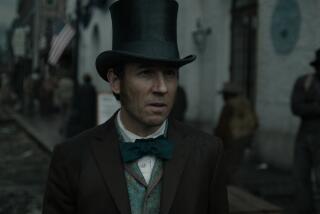Of Marital Infidelity, Murder and a Bit Player in the Civil War
- Share via
AMERICAN SCOUNDREL
The Life of the Notorious Civil War General Dan Sickles
By Thomas Keneally
Doubleday
360 pages, $27.50
The Civil War is the greatest story of American history, judging from the thousands of books written not only about its epic battles and its heroes but also about those who played small parts.
Dan Sickles is, at most, a bit player. In “American Scoundrel: The Life of the Notorious Civil War General Dan Sickles,” Thomas Keneally writes that Sickles directed one of the more controversial maneuvers as a Union corps commander at the Battle of Gettysburg by getting his troops into a stronger but more exposed position. It was a gambit that he paid for by losing a leg in the battle.
Other than that, he is a distinctly peripheral character. His varied career was marked by terms in Congress, a friendship with President Lincoln, diplomatic assignments in Britain and Spain and a key role in the establishment of New York City’s Central Park. Most interesting, at least to this author, he was an actor in a scandal that saw his young wife enter into an affair with Philip Barton Key, the son of the writer of our national anthem. When Sickles found out, he killed Key in 1859.
In a trial that was the entertainment of the day, Sickles was found not guilty, or perhaps it might be said the jury came to the conclusion that his gunning down of the unarmed Key in Washington’s Lafayette Square was justifiable homicide. His lawyers gave the jury an excuse, contending that Sickles was suffering from temporary insanity at the time, a defense that apparently had not been used successfully until then.
Sickles--a passionate man, it seems, at all times--never forgave his wife, Teresa, for her transgression, and in her short life before she died at 31 of tuberculosis, he never treated her decently again. But soon after 1859, Sickles became a Union general and a friend of Lincoln.
Was he a “scoundrel” in the dictionary definition of that term, “a mean, immoral, wicked person, a rascal”? In many respects, yes. Keneally, author of “Schindler’s List” among other books, certainly makes a big point of Sickles being a politician not above taking bribes and a man guilty of much lascivious behavior. After all, rather than take his beautiful young wife to London on his first diplomatic assignment, he took his mistress, Fanny White, a known prostitute. And then he took White to a royal reception, palming her off as the daughter of a New York newspaper publisher who had been critical of him.
This is being scoundrelly, no question, and the author makes the most of it. But it also becomes clear that Sickles has a few redeeming qualities. A Northern Democrat sympathetic with the South, he nonetheless casts aside these associations when the Union is in jeopardy and volunteers to be a leader of Union troops. He may be a political rascal, but he also stands up to the call of duty.
And Keneally is not exactly another Shelby Foote as a historian. A gap in the historical record doesn’t stop him. When documents are lacking, Keneally speculates a little too freely on a few too many occasions. While as a novelist he certainly has such license, it leads one to wonder how much of the real Sickles gets lost in Keneally’s narrative. “American Scoundrel” is an entertaining book, but for the history of the era, for the real Civil War, it is best to turn to Foote.
More to Read
Sign up for our Book Club newsletter
Get the latest news, events and more from the Los Angeles Times Book Club, and help us get L.A. reading and talking.
You may occasionally receive promotional content from the Los Angeles Times.










